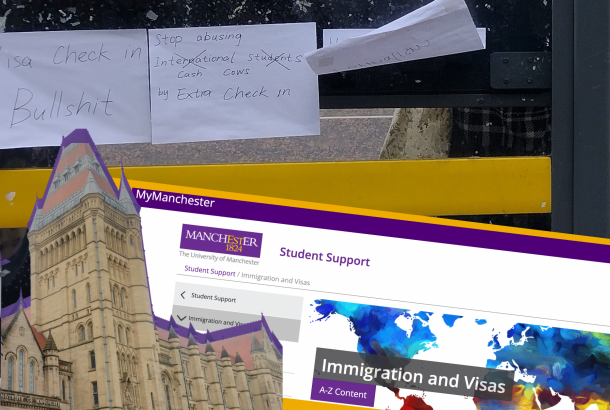“Environmentally conscious” UoM spent £250,000 on Amazon in 2020

The University of Manchester spent over £250,000 on Amazon purchases in 2020. Through a Freedom of Information request, The Mancunion has found almost 1 in 10 transactions made on UoM’s corporate cards, 1665 in total, were to the company.
This figure has shocked and saddened many University of Manchester students who are trying to be more environmentally conscious and shop local, particularly during the pandemic.
In September 2019 Amazon released a long-overdue environmental impact report which showed that the company was responsible for 44.4 million metric tons of carbon dioxide emissions during 2018.
During Welcome Week of the same year, Manchester students involved in Extinction Rebellion (XR) Youth glued themselves to the entrance of the Freebies Fair to raise awareness of the ‘environmental impact of some of the companies at the fair,’ including Apple and Amazon.
Imani, a third-year student at UoM said: “Amazon is not compatible with UoM being environmentally conscious, pandemic or not.”
Environmental sustainability has been a point of contention for the University in recent years, as they ranked 59th in People and Planet’s University League Table of Environmental Sustainability, 57 places behind Manchester Metropolitan University.
The University’s use of Amazon for 1 in 10 procurement card purchases during 2020 has raised some eyebrows, especially after data released in the Amazon environmental impact report showed that the company’s CO2 emissions in 2018 were roughly equivalent to Norway.
“Amazon is not compatible with UoM being environmentally conscious, pandemic or not.”
Imani, Third Year student at UoM
A University of Manchester spokesperson told The Mancunion that Amazon was used for “essential purchases to maintain teaching and research activities” during the pandemic.
But this seems to go against the University’s Responsible Purchasing Policy, known at other organisations as “green purchasing”, which is how they “ensure that the environmental, social and economic impacts of what we buy are considered within the procurement process.”
In fact, the University suggest its staff should use the website Ethical Consumer to inform their purchasing decisions, a website that perhaps lines up more closely with the calls of Manchester’s XR Youth as it encourages consumers to boycott Amazon “over its outrageous tax avoidance since 2012.”
A study by the tax transparency campaign group Fair Tax Mark in 2019 accused Amazon of ‘aggressive’ tax avoidance through tactics such as shifting profits and the use of tax havens. When contacted for comment, an Amazon spokesperson said in relation to tax allegations:
“We are investing heavily in creating jobs and infrastructure across the UK – more than £23bn since 2010. The UK has now become one of Amazon’s largest global hubs for talent and this year we announced plans to create 10,000 new jobs in the country by the end of 2021, taking our total workforce to over 55,000. This continued investment helped contribute to a total tax contribution of £1.1 billion during 2019 – £293m in direct taxes and £854m in indirect taxes.”
Students, such as Billie, a third year at UoM, also criticise Amazon for killing off the high street: “From outpricing small businesses and tax evasion, corporate structures like Amazon’s have no place in any future that is genuinely sustainable”. Reports indicate that local and small businesses have suffered greatly during the pandemic, with even some large high street chains forced to close their doors.
Whilst a University of Manchester spokesperson referenced the “exceptionally challenging circumstances of the pandemic,” a second year Economics student argued: “This past year it has been the most important to shop local and with small businesses, because lockdowns have hit them the hardest”.
When contacted for comment on whether Amazon have a hand in ‘killing the high-street’ and outpricing small businesses, a compant spokesperson told The Mancunion:
“Tens of thousands of small and medium-sized businesses sell in our UK store and third party sellers make up for more than half of all products sold on Amazon stores. You can read more here.”
The University of Manchester’s 10 Ways To Purchase Responsibly guide, references Manchester Veg People when saying, “We don’t always take the easiest route when buying products for use on campus. Buying products or services locally supports Manchester, and keeps money in our local community as well as reducing carbon emissions through reduced transportation.”
But the £250,000 spent on Amazon in 2020 suggests the easiest route was taken during the pandemic, despite potentially detrimental effects for local businesses and the environment.
When contacted for comment, a University of Manchester spokesperson said:
“As an institution we take the social responsibility and environmental impact of our procurement processes and supply chain extremely seriously. Due to the exceptionally challenging circumstances of the pandemic, however, we had to adapt to working remotely without any notice for staff who could no longer travel to campus. Like many other institutions and businesses this caused challenges for our usual procurement processes.
“Corporate cards are provided to support activities such as travel and sustenance for off-campus working or where normal purchasing routes aren’t available. We have been reducing the use of Amazon, though the period in question covers the suspension of normal campus working during lockdown. That means it includes essential purchases to maintain teaching and research activities, such as keyboards, web-cameras and microphone headsets.
“Overall, we provide a comprehensive range of information and materials for our staff on how to purchase responsibly and we’re very transparent in this area when reporting on our own procedures and impact at an institutional level. We were also the first university in the UK to adopt the Social Value Portal for our procurement. This helps us organise our spending practices and procurement processes in a more sustainable way.”
The Social Value Portal describes itself as a service which ‘allows organisations to measure and manage contributions that they, and their supply chain makes to society’.
In relation to allegations around sustainability an Amazon spokesperson told The Mancunion: “Amazon is committed to building a sustainable business for our customers and the planet. In 2019, Amazon co-founded The Climate Pledge—a commitment to be net zero carbon across our business by 2040, 10 years ahead of the Paris Agreement. We are on a path to powering our operations with 100% renewable energy by 2025 and we are now the largest corporate purchaser of renewable energy in Europe.”
The University of Manchester’s pledge in May 2020 to divest from fossil fuels by 2022 was certainly a positive step for student campaign groups, however it seems students are looking for further change from their University on where it spends its money.
This is the first of a three part series looking into the University of Manchester’s expenses during the pandemic.







